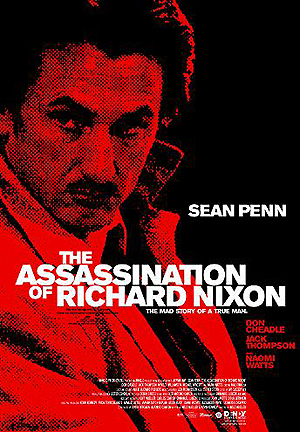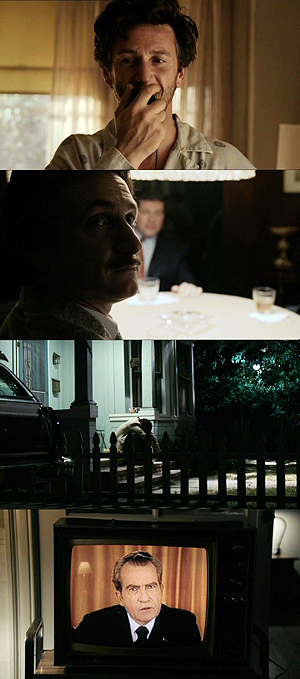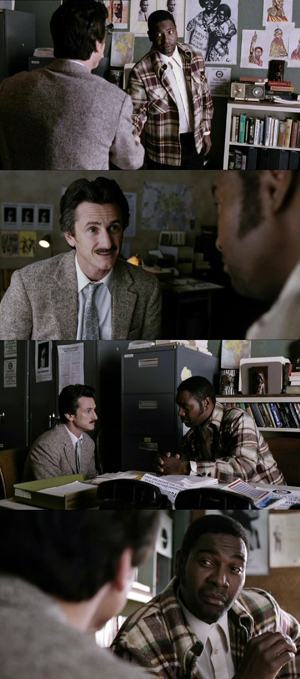
The Assassination Of Richard Nixon
ThinkFilm
Original release: December 29th, 2004
Running time: 95 minutes
Director: Niels Mueller
Writers: Niels Mueller, Kevin Kennedy
Composer: Steven M. Stern
Cast: Sean Penn, Don Cheadle, Jack Thompson, Naomi Watts, Brad William Henke, Michael Wincott, Mykelti Williamson
The Zebras 00:23:43 to 00:26:20
Deconstructing Cinema: One Scene At A Time, the complete series so far

Everyone, at some point in their lives, has experienced a sense of the world being against them. No matter what they do, circumstances never seem in their favour. Worse still, everyone seems to be unaffected by this, or at least unsurprised by this lack of fairness in the world. Things are meant to be different, people are meant to be different. How can you be the only one to feel like this? You’ve tried to be decent, hard-working, honest, but you just can’t seem to catch a break. Things have to change. Something must be done. Someone must be responsible. Such is the worldview of perennial loser Samuel Bicke.
In 1974, Samuel Bicke (Sean Penn) is a lonely and ineffectual salesman who feels wronged by his family, friends, employers and the world in general. He believes he stands for truth, honesty and integrity, so he regularly loses his job rather than lie to his customers. His plans for success are hindered by this sensibility. Pushed closer to the edge, he begins to associate both his failings, and those of society, with President Richard Nixon, who represents all things dishonest. As such, he decides that things must change and that he must therefore kill Nixon.
Almost to make the point of such a universal perception of the world being against us, when the original idea for the story was conceived, it was genuinely begun as a work of fiction. However, over the course of researching the period and story, the writers (Niels Mueller and Kevin Kennedy) discovered something very similar had actually occurred in the early 1970s.

Byck stormed a Delta Air Lines flight and, gun in hand, tried to force the pilots to get the plane in the air and crash it into the White House. His attempt failed and the airport police killed him on the plane, although he’d already claimed some lives himself. Things didn’t begin and end with a deranged man attempting to hijack a plane for the world’s most dramatic Presidential assassination.
He’d made several attempts to start a business, all of which failed. As time went on, his marriage became strained, he began to suffer from depression and he also began to harbour conspiratorial theories that the government was secretly trying to oppress the poor and underprivileged. He tried to join the Black Panthers, whom he believed shared his outrage at the system; he protested outside the White House, sometimes dressed as Santa Claus; and sent recorded messages to various public figures, explaining his motives to people he thought would understand. Frankly, had Mueller and Kennedy these facts in their writing, it would have been very foolish.
As it is, they recognised the weight of this story and tailored the idea to reflect Byck more directly. Of course, modifications were made for the purposes of a cleaner film. They concentrated more on his personal life, attempting to give a stronger sense of his motivations by focusing on the inadequacies and flaws. They show the awkward ineptitude of his working life, his inability to recognise his marriage is pretty much over and his strained interactions with other people in day-to-day life. The most significant part of Bicke’s life in the film is his belief that the reason he fails so consistently isn’t because he is himself a failure, but that he’s simply too honest in a dishonest world.
As far as Bicke’s concerned, the world is meant to operate on truth and integrity, that the honest people will thrive and the dishonest will perish. Essentially, he bought into the whole idea of the American Dream. The only problem is that world simply doesn’t work like that. Things aren’t fair, things aren’t equal. He looks around and sees racism, sexism, war, lies, and dishonesty. How can an honest person get ahead in this kind of system?
Of course, Bicke ignores the reality of his own personality and his own situation. For all of his espousal of being honest and true, he’s as big a liar as anyone. The people at his newest job think he’s a happily married man, even though he’s been separated for almost two years. His soon to be ex-wife believes he’s doing well in his new job, and can maintain support money for the kids. He likes to think that the reason he keeps quitting his jobs is because he refuses to lie to the customer (certainly an admirable quality), but the fact remains he’s just a bad and ineffectual salesman.

Considering how meagre an impression he makes on people and how poor he is at effective communication, this is a man of extreme arrogance. It’s one thing to look at the world around you and want to change it for the better, but when your reasons are built on a severe sense of delusion, it’s not going to get you far. His sense of how the world works is so skewed that when he applies for a loan, the fact that he was “honest” in filling out the form means that it’s as good as done. He honestly can’t see that, to the loan officer, he comes across as untrustworthy, unreliable and a little bit too intense. He also has the most bizarre idea for the Black Panthers, which he tries to pitch them directly:
I wanna throw an idea at you… Zebras.
HAROLD MANN:
Zebras?
SAMUEL BICKE:
Zebras. You see, they’re black, and they’re white. The Black Panthers become The Zebras, and membership will double.
What makes this particular scene interesting is that it sort of marks the first time that Bicke shows some level of honesty about himself, and what he may wish to accomplish in his own life. He wants to make it clear that he’s not The Man, he isn’t “the guy in the Cadillac”, that he is just like the many disaffected members of the black community. To him, it makes perfect sense, and his idea of a more integrated “Zebras” is flawless. However, it’s a clear signpost that he has a fundamental misunderstanding about how things work in the world, believing that his struggle with the system is no different than that of your average oppressed black man of the early 70s. He doesn’t get that theirs was a portion of society actively hindered and oppressed by those in power, and that theirs was a pursuit of representation, recognition, equality. Bicke’s just an egotist… and a lousy salesman.
In the film, they refer to a good salesman having “competitive spirit.” This is something Bicke most definitely doesn’t have. He ultimately gets pushed too far and begins to take action towards changing the broken system, and uses something of a personal barometer in selecting both his target and his confessor. For the former, he chooses President Nixon, the incredibly unpopular politician who still managed to get elected twice. His boss describes Nixon as the best salesman in the country, selling the public on one thing, not delivering on that promise and then selling it all over again. Clearly, it’s not just Bicke that thinks he’s corruption incarnate. For the latter, Bicke looks to composer Leonard Bernstein, whom he believes is a man who’ll understand his struggle, his plight, his need for a world built on truth and honesty.
The character of Bicke is very well drawn, and played in typically excellent manner by Sean Penn. The actor’s always been someone possessed by a simmering frustration with the world around him, and his constant protests and remonstrations make him the most suitable candidate for the role. Even if we don’t like Bicke, we can sympathise and understand how he comes to be as fractured and desperate as he is. As he approaches situations of confrontation, where he feels that something inherently unjust is occurring, he reacts with a blend of queasy discomfort and indignant rage.
- [1] M. Keith Booke, From Box Office to Ballot Box: The American Political Film (2007), Praeger Publishers Inc.
However, I feel like there’s a degree of incompleteness to the film. Although we understand why his target is Nixon, because he just flat out tells us, more could’ve been done to underline these feelings. Nixon is really just an occasional background figure, shown on televisions in bars or Bicke’s workplace. There’s never anything really done to make us believe that Bicke believes there to be a direct link between Nixon’s dishonesty and his own failing. Of course, these feelings would’ve been baseless, since Nixon wasn’t actually out to get this guy, but they don’t really have to make rational sense to us, we just have to think it makes sense to him. Bicke barely mentions him.
I said at the start of this that we’ve all had moments when we felt like the world was against us, with no explanation as to what we did to deserve it. This is effectively the central conceit of the film. Bicke’s the guy who sees the world around him as broken, unfair, without honesty… and then decides to do something about it, to make a stand for justice. He doesn’t get that his biggest enemy is himself, and that his own broken, dishonest world is one of his own construction. Being honest with yourself is just as important being honest with others.


Paul Costello
Paul Costello is a critic, blogger and former film editor with a degree in filmmaking from the University of the West of Scotland. He’s been watching movies for as long as he can remember, and began the process of writing about every movie he owns on his blog: acinephilesjourney.blogspot.co.uk. He’ll be at that for a while. He’s also the resident film writer at TheStreetSavvy.com.
You can follow him on Twitter @PaulCinephile.
© 2022 STATIC MASS EMPORIUM . All Rights Reserved. Powered by METATEMPUS | creative.timeless.personal. | DISCLAIMER, TERMS & CONDITIONS
HOME | ABOUT | CONTACT | TWITTER | GOOGLE+ | FACEBOOK | TUMBLR | YOUTUBE | RSS FEED
CINEMA REVIEWS | BLU-RAY & DVD | THE EMPORIUM | DOCUMENTARIES | WORLD CINEMA | CULT MOVIES | INDIAN CINEMA | EARLY CINEMA
MOVIE CLASSICS | DECONSTRUCTING CINEMA | SOUNDTRACKS | INTERVIEWS | THE DIRECTOR’S CHAIR | JAPANESE CINEMA





